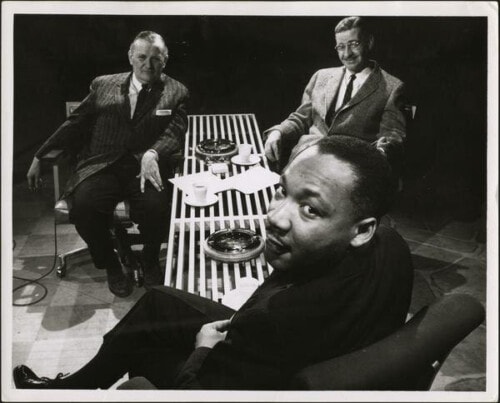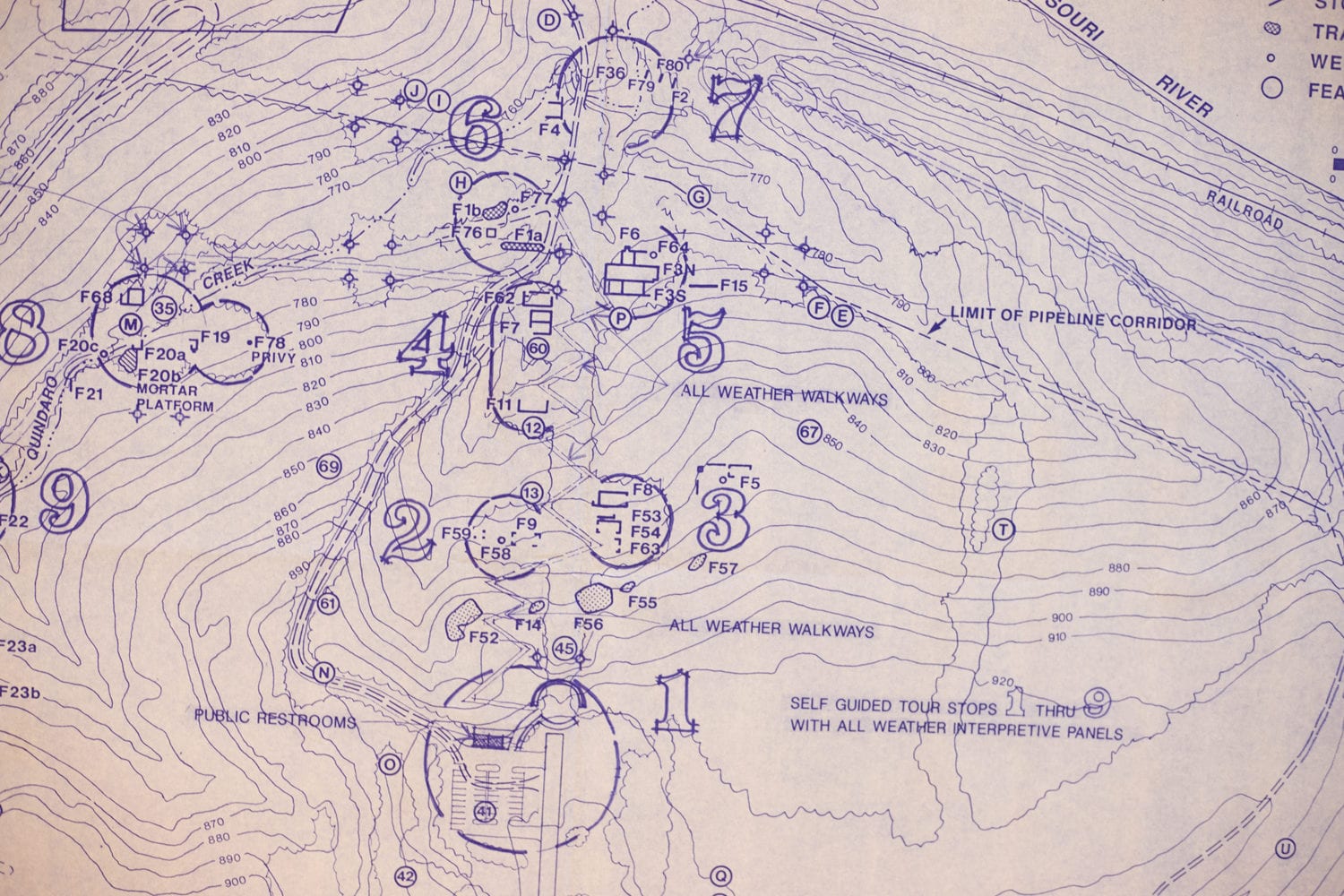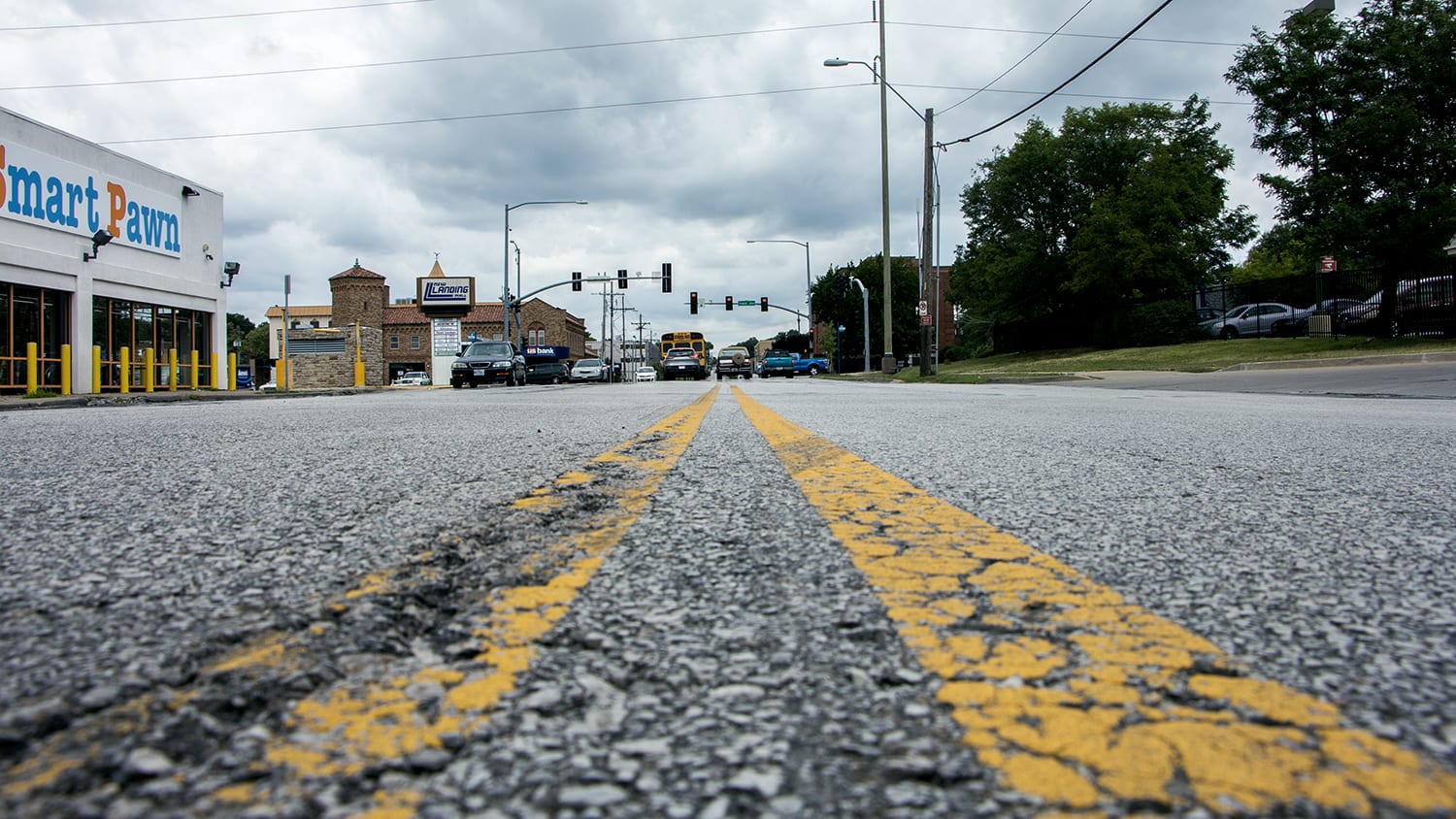Q&A: KU Professor Randal Jelks on the New Book, ‘Letters to Martin’ ‘I wanted to provide students hope’
Published January 17th, 2022 at 6:00 AM
Above image credit: Martin Luther Jr. stands at a pulpit, with a light shining behind him. Jr. was a speaker at the Mammoth Rally on May 3 in the late 1950s. (Library of Congress)In the new book “Letters to Martin” by Randal Jelks, who is a professor of African American and American studies at the University of Kansas, the reader gets the sense they’re observing an intimate conversation between two scholars.
Each letter has a theme, detailing life as it is happening today to the late Martin Luther King Jr., a man whose legacy has had such a large impact on civil rights, and the social justice movements we see today.
Jelks’ letters underscore today’s events in context with King’s teachings. The goal, he said, is to on one hand grasp what was happening during a tumultuous election cycle, and on the other help his students understand their place in the world. He calls these letters “meditations.”
“Meditations have a long history through from the ancient world to the present,” Jelks said, explaining why he chose this method. “I wanted to think about democracy … from the perspective of African Americans. I thought, no better way than to write a series of meditations as though (I’m) writing letters to Martin Luther King Jr.”
The author also is a documentary film producer. He’s currently working with the Oscar-winning screenwriter and director Kevin Wilmott on a documentary about Langston Hughes.
Jelks said experiences as a young boy in New Orleans made deep impressions on who he became later in life — a scholar of African American studies. He added that experiences of the 2016 election ignited the essays that are now part of his new book.
“(The idea for the book) also began when I visited the Elmhurst College Now University, just outside of Chicago, on MLK Day, just shortly after former President Donald Trump was inaugurated,” he said. “I wanted to provide students hope. And I wanted to provide them a message (of) why democratic struggle is worthwhile – no matter where it is – and so I use this format of a letter. And then I thought to myself, ‘Wow, this is great for a book.’ So I continued it.”
Flatland on YouTube
The remainder of this Q&A has been edited and shortened for clarity.
Flatland: I love that it is in the format of letters because it feels extremely personal. Can you talk a little bit about some of the moments that have influenced your work?

Randal Jelks: When I was 11, Martin Luther King Jr. was assassinated. One of the things I didn’t put in (the book) was when (the announcement) came across the television. (My mom) just said, in a very stoic manner, “I always knew this was going to happen.” And it struck me.
And then when we returned back to school (after) the Easter break, my teacher, Mr. Price, then in sixth grade in the city of New Orleans, had all of these records and he made us listen to them all day.
We had to listen to King’s speeches. And it was very moving to me and very powerful.
Flatland: Wow. So what were some of the things that were going through your head as you were writing each of these meditations or letters? I was going through the chapter on the highest ethical ideal, which is really quite important, even today as we’re living through a pandemic, right?
RJ: I think democracy has its procedural sides. The laws, how legislation should be passed. That’s really important in the Constitution — to protect the rights of individuals and persons and communities. But there also has to be, at some level for all of us, a commitment to democracy, whether that’s emotional or spiritual.
We have to be committed in how we live our own lives, and for King this high ethical ideal that democracy could be lived out. I mean, that came out of his Baptist tradition, of course, but that doesn’t mean that doesn’t preclude for any of us having high ethical ideas by which we choose to live our lives by and democracy has to begin with both emotional or, or spiritual commitment.
Flatland: If there was one message that you were trying to send to the next generation, would you be able to kind of sum that up?
RJ: One, it’s always a struggle. There are always sacrifices to be made for any kind of sustaining institution, or commitment. And sometimes I think young people think it’s, it should be well, we saw that and it should be solved. Two, it’s an ongoing commitment. And we have to make that ongoing commitment every day. Not just in the big public things, which are important, but also in how we treat our fellow human beings. Just on the streets. There are some ethics of living a democratic life. And I think we should engage in that.
Flatland: Have conversations in the classroom inspired you?
RJ: I taught on two occasions, a graduate seminar around King and many others. Martin Luther King was not the only person and I would never say that, but he was the voice of a movement.
In the graduate seminar we talked about the kinds of varieties of ways of seeing activists, what kind of commitment they make, sometimes at the expense of their own families, and to achieve what they’re attempting to achieve.
I always tell my students upfront, I don’t have any answers. I wish I did. I’d be on Oprah, if I did. But I do know, we have to continue to think through these problems, and not just take them for granted. We have to think through this so that we honor our own commitment, the very spirit.
This is one of the things that (Martin) saw — the very strength of the United States. The very power of the United States doesn’t come from all the nuclear arms or economic power, but the ability that people can be respected from wherever they are. And that’s pretty powerful.
Flatland: I love the connection you mention in one section of the book where you’re talking about faith, and your own upbringing, and how you felt that connection with Martin Luther King Jr. Can you expound on that?
RJ: My great-grandfather was a Baptist minister, and his father out of slavery was a Baptist minister. So religion in my household, by my tradition, was an important thing in that it was one of the things that sustained many African Americans over the centuries.
That was a commitment. You know, still people in the South attend church. Still, they have a faith that there is some providential force out there, working on their behalf. That (tradition) kept (them going) through slavery.
So sometimes I really worry because the rates of suicide in Black communities have really gone up, far different than even in my grandparents’ generation, who lived under Jim Crow. And it seems to me that we have this diminished faith out here. And then that really is important for all of us to have some kind of — and I don’t mean always religious faith — but some kind of faith to live by.
Flatland: That’s being magnified, even in these really weird times the past two years. Is there anything that you want to share about that?
RJ: I mean, the pandemic has exposed the vulnerabilities we all felt. But the ways that those faith communities worked, were that they were a gathering place for people to share their joys, their sorrows, their burdens, their happiness, all of those things.
(Humans), we’re social. It’s important for us to find community where we can both share the goodness and the sadness, and that we can all support each other through difficult times. In those communities, in particular, the Protestant ones, people chose their ministers, they chose their deacons. They had a say and a stake in these institutions. Now, we make life in such a way that people don’t have a stake in their local institutions. And that’s a dangerous thing.
Flatland: It’s clear that for Martin Luther King, the values he carried were influenced by his faith, but what other things were instrumental to him being the powerful leader who influenced you?
RJ: People forget Martin King was 26 when he started out. And 13 years later, he looked much older. Leadership adds its burdens, and being out in public, so young, for 13 years. That’s a pretty, pretty harsh thing. But he felt like that was a necessary sacrifice, that he was caught up in the winds of time, and it was a necessary sacrifice.
He was imperfect like we all are, but we all have to commit to something. Whether it’s just writing to our city councilperson, and keeping the laws on the books.
I often tell my KU students that, you know, you could be arrested for a law that was written in 1980. Police will see it’s on the book and is still active, even though it doesn’t make sense today. If you don’t ask questions about that, then you will wind up seeing those kinds of laws being used abusively.
We have to always struggle to keep that transparency of institutions going.
Flatland: One thing that I really liked, and I’m going back probably to the beginning, but it’s how you kind of humanize Martin and talking about how he reminds you of your uncles?
RJ: The thing is Dr. King never wanted to be caught smoking cigarettes. And there’s one picture where you can see he’s utterly exhausted. He’s in the Montgomery airport with his top aid, Andrew Young, and he has a cigarette and he’s stooped over.

It just reminded me so much of the working-class neighborhood I grew up in, in New Orleans. How men, particularly men who worked at docks, had the same pose. After having worked all day. Democratic struggle is labor, just like the men who go to work every day that I saw as a kid, who I respected a great deal for going to work and trying to keep their homes and their families supported.
Flatland: How are you feeling about this book being published?
RJ: This is the fourth time around, and I always feel good about getting a book published. I wanted to be a writer in college, and you know, that dream seems to have come true.
I want to engage a larger audience, a younger audience, and have conversations about their lives, as meditations come from, like I said, from the ancient world from Marcus Aurelius. The Roman Caesar even wrote meditations, as you reflect about the world around you.
We face climate change. That’s a real issue for us. And it’s going to create its own sets (of challenges). It already has political turbulence as we have more climate change refugees. And we have to think about how we want to approach this. This has to be, at minimum, a philosophical commitment, because it’s going to challenge all of us.
Events to Honor MLK Day:
Jan. 17: Dr. Martin Luther King Jr. Mass. Celebration •. Free virtual tickets here
Jan. 17: Martin Luther King Jr. Breakfast & Community Discussion • Free tickets here
Jan. 18: MLK Day Celebration with Kareem Abdul-Jabbar •. Free virtual tickets here
Jan. 18: MLK Skate at Winnwood Skate Center • Tickets here ($5-$10)
Flatland: Any final thoughts or messages that you want to send out to any readers out there?
RJ: I want (people) to read in any way, anywhere, and enter in conversation with young people. I wanted to do something different in academics. And I wanted to say, I hope this book mobilizes people for good. And there are many kinds of goods. I’m hoping that we have a lot more people engaging in building a better democracy, a more inclusive democracy.
Flatland: What’s something you did not say in your letters to Martin? If you could tell him something right now, what would you tell them?
Oh, I would tell him to take a vacation. (For) 13 years, he was just inundated. And I would have said, “Well, Dr. King, you need a couple of months off. You need a sabbatical to go. Rest.”
I would tell everybody they need a sabbatical. To renew and to recharge. Everybody needs a beach to go sit down.
Flatland: I feel that deeply.
Vicky Diaz-Camacho covers community affairs for Kansas City PBS.






